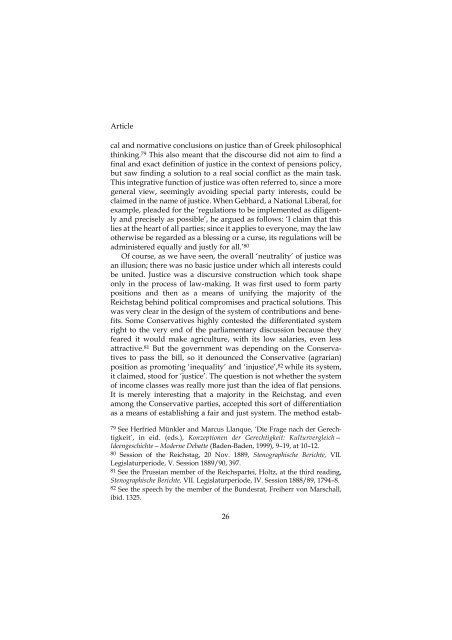Download - German Historical Institute London
Download - German Historical Institute London
Download - German Historical Institute London
You also want an ePaper? Increase the reach of your titles
YUMPU automatically turns print PDFs into web optimized ePapers that Google loves.
Article<br />
cal and normative conclusions on justice than of Greek philosophical<br />
thinking. 79 This also meant that the discourse did not aim to find a<br />
final and exact definition of justice in the context of pensions policy,<br />
but saw finding a solution to a real social conflict as the main task.<br />
This integrative function of justice was often referred to, since a more<br />
general view, seemingly avoiding special party interests, could be<br />
claimed in the name of justice. When Gebhard, a National Liberal, for<br />
example, pleaded for the ‘regulations to be implemented as diligently<br />
and precisely as possible’, he argued as follows: ‘I claim that this<br />
lies at the heart of all parties; since it applies to everyone, may the law<br />
otherwise be regarded as a blessing or a curse, its regulations will be<br />
administered equally and justly for all.’ 80<br />
Of course, as we have seen, the overall ‘neutrality’ of justice was<br />
an illusion; there was no basic justice under which all interests could<br />
be united. Justice was a discursive construction which took shape<br />
only in the process of law-making. It was first used to form party<br />
positions and then as a means of unifying the majority of the<br />
Reichstag behind political compromises and practical solutions. This<br />
was very clear in the design of the system of contributions and benefits.<br />
Some Conservatives highly contested the differentiated system<br />
right to the very end of the parliamentary discussion because they<br />
feared it would make agriculture, with its low salaries, even less<br />
attractive. 81 But the government was depending on the Conser va -<br />
tives to pass the bill, so it denounced the Conservative (agrarian)<br />
position as promoting ‘inequality’ and ‘injustice’, 82 while its system,<br />
it claimed, stood for ‘justice’. The question is not whether the system<br />
of income classes was really more just than the idea of flat pensions.<br />
It is merely interesting that a majority in the Reichstag, and even<br />
among the Conservative parties, accepted this sort of differentiation<br />
as a means of establishing a fair and just system. The method estab-<br />
79 See Herfried Münkler and Marcus Llanque, ‘Die Frage nach der Ge rech -<br />
tigkeit’, in eid. (eds.), Konzeptionen der Gerechtigkeit: Kulturvergleich—<br />
Ideengeschichte—Moderne Debatte (Baden-Baden, 1999), 9–19, at 10–12.<br />
80 Session of the Reichstag, 20 Nov. 1889, Stenographische Berichte, VII.<br />
Legislaturperiode, V. Session 1889/90, 397.<br />
81 See the Prussian member of the Reichspartei, Holtz, at the third reading,<br />
Stenographische Berichte, VII. Legislaturperiode, IV. Session 1888/89, 1794–8.<br />
82 See the speech by the member of the Bundesrat, Freiherr von Marschall,<br />
ibid. 1325.<br />
26













